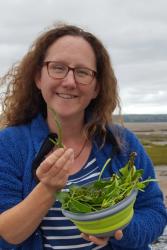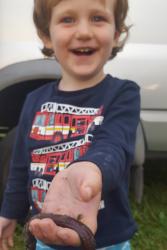What does gathering from the seashore mean to the modern hunter gatherer
 KESS PhD student Liz Morris-Webb, after a successful forage for some tasty coastline plants, including glasswort and sea purslane.Liz Morris-Webb, a researcher at Bangor University’s School of Ocean Sciences is looking for people who gather from the seashores of Wales to take part in her research. If you forage for food, bait, money, education, medicine, research or something more unusual, you can take part.
KESS PhD student Liz Morris-Webb, after a successful forage for some tasty coastline plants, including glasswort and sea purslane.Liz Morris-Webb, a researcher at Bangor University’s School of Ocean Sciences is looking for people who gather from the seashores of Wales to take part in her research. If you forage for food, bait, money, education, medicine, research or something more unusual, you can take part.
There is increasing interest in ‘nature’s contribution to people’ from policy makers and conservationists. Liz is researching the human dimensions of the marine environment and believes they should be considered as well as economic values when considering the Well-Being of Future Generations in Wales. Foraging for wild food is regularly trending in the press. But it is not a new activity, gathering was fundamental to human evolution. Liz believes that the modern personal, familial and cultural values associated with the ancient activity of gathering should not be forgotten and that this is a good time to tell your stories. She is offering all Welsh gatherers the opportunity to document their thoughts and feelings about how gathering affects them by taking part in her 15 minute, anonymous online survey (https://bangor.onlinesurveys.ac.uk/what-does-gathering-from-the-seashore-mean).
Talking about the research, KESS PhD student Liz recalls the reasons she started her PHD and why she thinks gatherers should get involved with the project:
“I’ve worked with bait collectors, cocklers, seaweed pickers, commercial fishermen and recreational anglers on several previous projects with my PhD partner company Marine Ecological Solutions Ltd. (Marine EcoSol). Every person has had a story to tell of why they love doing what they do, and why they believe it’s important to them. Some never value their own activities until there is a threat of change from changing stocks, a proposed development or potential management. And what’s more, nobody has asked them.”
Liz has spent the summer visiting the beaches of Wales talking to people collecting from the shore.
She says: “Often the people I talk to don’t realise the importance of their own activities until they dissect it with my questionnaire. Most go away with a smile on their face and a greater understanding of themselves.” In the words of a cockle gatherer from South Wales “working the sands is not a job, it’s a way of life.” Gathering seems to connect us with our history, family, surroundings and even our inner self.
 The thrill of the find is something shared with participants from 3 to 83. “It would be a shame if these historically important species or activities were lost. So I am attempting to understand the meaning of this very traditional activity to the modern seashore gatherer” finishes Liz. If you gather from the seashore have a go at her questionnaire to think more about why you gather in an ‘Age of Consciousness’, when most things you want are only a click of the mouse away.
The thrill of the find is something shared with participants from 3 to 83. “It would be a shame if these historically important species or activities were lost. So I am attempting to understand the meaning of this very traditional activity to the modern seashore gatherer” finishes Liz. If you gather from the seashore have a go at her questionnaire to think more about why you gather in an ‘Age of Consciousness’, when most things you want are only a click of the mouse away.
Take at https://bangor.onlinesurveys.ac.uk/what-does-gathering-from-the-seashore-mean or contact Liz to arrange a personal interview.
Liz Morris-Webb’s research scholarship is funded under the Knowledge Economy Skills Scholarships (KESS 2) programme, a pan-Wales higher level skills initiative led by Bangor University on behalf of the HE sector in Wales. It is part funded by the Welsh Government’s European Social Fund (ESF) convergence programme for West Wales and the Valley and is part funded by company partner Marine Ecological Solutions Ltd. (Marine EcoSol). www.marine-ecosol.com Both the Research Masters and PhD elements are integrated with a higher-level skills training programme, leading to a Postgraduate Skills Development Award. KESS 11 will run until 2022 and will provide 600+ PhD and Research Masters opportunities across Wales.
Publication date: 5 December 2018
